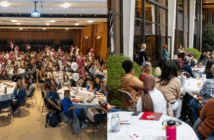Each year the NASW selects one or more topics to lobby for or against. This year the NASW had two important topics: 1) To push for an initiative that would provide more funding and support for Social Workers statewide, and 2) to pass a bill that outlaws conversion therapy for anyone under the age of 18, and to prohibit Licensed Mental Health Professionals from providing the “therapy” and remain licensed. Of course, I fully support the first measure to raise financial support from the state to social workers, but as a gay man who was raised in a Christian conservative community in southern Ohio, the latter touches very close to home. I mean, my upbringing inspired me to create a business called The Proud Path, an educational and mentorship program for parents of queer youth, as well as a series of workshops and lectures I have developed for teachers, social workers, students, at public and private schools, various conferences and Big Brothers and Big Sisters of NYC.
What is Conversion Therapy?
First, let’s talk about what conversion “therapy” is. Conversion therapy is a practice born
out of the Christian conservative population to assist LGBTQ identified people to “convert” back
to being straight and cisgender (non-transgender). It is more often used on young men to
convince them that they aren’t homosexual, that those desires are of the devil, and that it’s likely
because of a distant relationship with the father in the home or an overbearing mother (Freud
much?). Almost all conversion therapy practitioners require patients to sign a non-disclosure
agreement, making it nearly impossible for the young people who have experienced it to discuss
it publicly. This tactic has worked to keep the inner workings of conversion therapy out of the
public sphere. However, we only need to look at the data to get a clear idea of the “practice.”
The American Psychological Association’s Relations Director said that conversion
therapy leads to “depression, anxiety, suicidal thoughts, substance abuse, and risky sexual
behaviors, and harm self-esteem.” A recent New York Times Opinion piece was written by a
man who experienced conversion therapy. His experience has left him scarred for life: “But it
didn’t stop with these hurtful talk-therapy sessions. The therapist ordered me bound to a table to
have ice, heat and electricity applied to my body. I was forced to watch clips on a television of
gay men holding hands, hugging and having sex. I was supposed to associate those images with
the pain I was feeling to once and for all turn into a straight boy. In the end it didn’t work. I
would say that it did, just to make the pain go away.” This horrific experience is expected to
happen to over 20,000 youth before they turn 18, according to a UCLA study.
My Story
While I personally was not subjected to torture of this nature, in my church I was often
lectured by deacons, youth group leaders and even the pastor about my behavior. I was yelled at
for skipping outside because I was “a 13 year-old young man,” I was told to learn about all the
sports news and quizzed on it, and definitely heard almost weekly (because we went to church 5
times a week) that homosexuals are an “abomination and going to hell.” These were experiences
I didn’t share with my family until I was in my late 20’s because of all of the shame and guilt I
still had. I felt as though I was a failure because I hadn’t been able to transform into a “normal”
boy. Also, my fiance comes from a similar religious background, and was subjected to
conversion therapy. He has had a history of anxiety and depression, and chose the same route as
the NYT Opinion author, lying to everyone he knew to avoid going back. The psychological
gymnastics a queer youth in conversion therapy must perform to stay sane are unbelievable. This
is why The Proud Path is dedicated to fostering empathy and understanding in the parents of
queer youth, in hopes of driving down anxiety, depression and suicide. Clearly, advocating
against this dogmatic and inhumane “practice” felt cathartic and vital to me, for my partner, and
the queer community at large.
Legislation, Education and Advocacy Day (LEAD)
The LEAD coordinators had lots of information and talking points at the ready, and even
setup individual meetings with MSW students and the elected officials in their home district. I
recently had the pleasure of speaking to the office of my State Senator, Martin Malavé Dilan and
the State Assemblywoman from Fordham’s Lincoln Center district, Linda Rosenthal. Both
support banning conversion therapy for minors, and Assemblywoman Rosenthal is a cosponsor
of a bill to do just that in the NYS Assembly, which has passed the bill several years in a row. In
talking with them, knowing their support, it became clear that this issue was very divided by the
aisle. It was wonderful to know of their support, but difficult to know that there were many who
didn’t feel the same. It is my hope that as more information and research become public around
the detrimental outcomes of conversion therapy, more congress members will see this for what it
is, torture.
I learned a lot from my LEAD day in Albany, in particular how accessible our elected
officials are. Their doors are open, you can make appointments and send information. Call them
to make your voice heard. They are chosen by the people to work for the people. That means
you. If you don’t agree with conversation therapy, tell someone, send an email, pick up the
phone. In this very interesting (to say the least) political atmosphere, states like NY and cities
like NYC lean heavily on state and local policy to create the culture in which we want to live.
And those policy makers are an extension of you, and the world you want to live in. If this
practice isn’t a part of that world, what can you do today to remove it?
If you want to learn more about Nathaniel and his work with The Proud Path, go to
www.theproudpath.com, add him on Facebook and Instagram @theproudpath, and follow him on
Twitter @proudpath.



